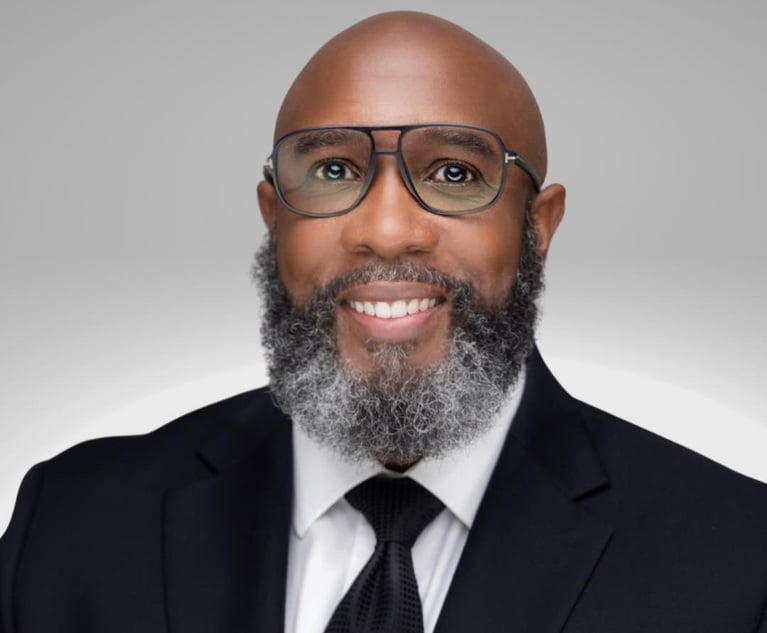Who Says Miami Litigators Are Hard-Nosed? Empathy Galvanized Manuel Dobrinsky's Career
"You have to send the message that, 'You can't do this because you will pay the consequences for it,' " said Manuel Dobrinsky of Miami's Dolan Dobrinsky Rosenblum Bluestein, beginning a two-year term as president of Legal Services of Greater Miami.
March 13, 2020 at 02:40 PM
8 minute read
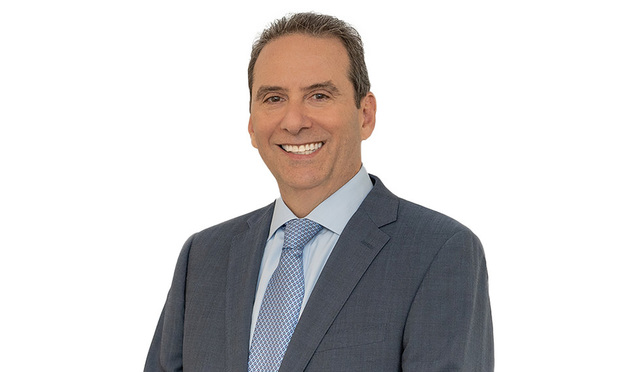 Manuel Dobrinsky of Dolan Dobrinsky Rosenblum Bluestein LLP in Miami. Courtesy photo.
Manuel Dobrinsky of Dolan Dobrinsky Rosenblum Bluestein LLP in Miami. Courtesy photo.
Legal Services of Greater Miami's new president, Manuel L. Dobrinsky, of Dolan Dobrinsky Rosenblum Bluestein LLP, can trace his penchant for pro bono work back to the advent of his legal career. Back then, as part of Holland & Knight's community service team, he tackled what was the largest housing discrimination case in the country.
It was the early 1990s, and something fishy was going on in North Miami.
Whenever black renters applied to move in to one of the Hamlet Estates' 700 apartments, the answer, regardless of their credentials, always seemed to be "no." So the Housing Opportunities Project for Excellence conducted a clandestine experiment.
They had one black tester with desirable qualifications apply alongside a white tester with unimpressive credentials—and the results confirmed suspicions of discrimination.
In a subsequent search of the main office, Dobrinsky and his team unearthed a pile of applications marked with a race-based coding system in what staff claimed was just a broom closet.
"They were coding them with DA that they claimed stood for 'Didn't answer,' " Dobrinsky said. " But then they would have quotes like, 'Light skin DA,' or 'DA but nice,' 'DA with nice girlfriend,' 'DA with white friend.' "
After years of negotiations—and tracking down money tucked away in Canada—Dobrinsky and his team helped obtain a $3.39 million settlement.
It was the largest of its kind at the time, and cemented Dobrinsky's convictions that civil lawsuits work wonders.
" You have to send a message, and the most powerful message in our society is economic," Dobrinsky said. "You have to send the message that, 'You can't do this, because you will pay the consequences for it.' "
As a federal public defender, Dobrinsky faced another test. A client accused of being part of a Colombian drug gang, the Cali cartel, refused all plea deals, even if it meant no jail time.
The man was one of about six defendants, and insisted he was innocent. But at his age, a guilty verdict could have taken his freedom forever.
" That was a lot of pressure, because here I am, if I lose this case, this 50-year-old gentleman is going to be incarcerated literally until he dies," Dobrinsky said.
After a six-month trial involving three defendants and leaving "no stone unturned," Dobrinsky heard the words he'd hoped for: "not guilty."
The federal public defender's office is the ultimate training ground for aspiring civil litigators, according to Dobrinsky, who cut his teeth on cases the government won at least 70% of the time.
"It's the cases you lose where you really learn," he said. "If you care, you're always wondering, 'What did I miss? How did I argue this?"
Likewise, cross-examining high-level special agents as a newbie provides experience that civil firms can't.
"Imagine you have a really large case coming up and there's a really important witness," Dobrinsky said. "You're not going to let the lawyer who has never done this before do it."
Now, he says he's never intimidated by a witness, "because I've stood up there and taken my lumps, and really learned how to think fast on my feet."
'Not even a close second'
Dobrinsky's zeal for defending the disadvantaged morphed into the personal injury realm in 1998, where he took on harrowing cases for parents who'd lost their child, and families whose lives were destroyed by doctors' mistakes.
Ask Dobrinsky about that period of his life, and he'll tell you about those clients.
He'll tell you about the little boy left severely brain-injured after an accident, whose parents couldn't afford proper amenities and barely slept because the 24-hour help their son needed only came during the workday. Meanwhile, the boy's little brother received minimal attention.
"The family didn't have a large enough house, so the hospital bed was in the dining room, and the way they needed to bathe him was they would bring in a hose from outside and one of those plastic pools to catch the water," Dobrinsky said.
They obtained a new house with proper accommodations and round-the-clock care.
"You always want to take pride in what you do, but you don't want it to get so far ahead of you that you forget that these are people who have lost what's most important to them," Dobrinsky said. "You've got to be cognizant that this is not even a close second to what they really want."
Dobrinsky might also tell you about the parents whose son killed himself after being released from a facility less than 24 hours after a suicide attempt. Dobrinsky argued his clients trusted experts, who said their son was OK.
Jurors awarded $2.4 million, $400,000 more than the plaintiffs asked for. But that wasn't the main takeaway for Dobrinsky.
"For the jury to find that the parents had absolutely no fault was incredibly important, because you could imagine the guilt," Dobrinsky said.
Now, Dobrinsky has embarked on a two-year term as president of Legal Services of Greater Miami, where the goal is to help those who can't help themselves, "Not because they don't want to and not because they don't try, but just because they don't have the means to do it."
Growing up in Plantation, Dobrinsky's family had their own run-in with discrimination, as their house was egged and tomatoed by a group averse to the idea of Jewish Colombian immigrants living nearby.
'A jaundiced eye'
Since 2015, Dobrinsky's firm has focused on catastrophic personal injury and commercial litigation, obtaining several multimillion-dollar verdicts and settlements.
An instructor for the National Institute of Trial Advocacy, which teaches trial skills to new lawyers, Dobrinsky's quiet confidence and courteous reputation earned him a place on Miami-Dade Circuit's professionalism committee. The group intervenes when attorneys face grievances for behavior that doesn't rise to the level of a bar complaint, such as name-calling or ignoring emails.
Unfortunately, Dobrinsky has noticed Miami's reputation for less-than-civil behavior means its lawyers often have a lot to prove when trying cases out of town.
"I think that the judges initially look at the lawyers from Miami with pretty much a jaundiced eye. They picture us being very aggressive and very over the top," Dobrinsky said. "So when we go over there and the judges see that the way we behave is not like that, and that we admit when we're wrong, we don't represent things that we don't know to be true, I think after a little bit of time the judges end up appreciating the way we litigate."
Dobrinsky also dabbles in miscellaneous litigation, often teaming with Miami lawyer Andrew Moss of Kutner Rubinoff & Moss. In one case, landing a $1.2 million settlement with the Broward Sheriff's Office over allegations disgraced former Fort Lauderdale attorney Scott Rothstein arranged for the false arrest of an associate's ex-wife.
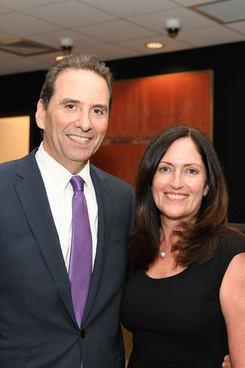 Manuel Dobrinsky with his wife Annette. Courtesy photo.
Manuel Dobrinsky with his wife Annette. Courtesy photo."In the numerous cases we have worked on together we have had disagreements, but it has never affected the case because whatever is best for the client is what's important to him," Moss said. "He has amazing judgment and works harder than any lawyer I've worked with."
Dobrinsky has two daughters with his wife Annette, whom he's been married to for more than 30 years.
"It's been longer for her," Dobrinsky quipped. "It's like dog years. I always practice in front of her and she points out where I could be better, then I get frustrated and realize she's right."
The Legal Services of Greater Miami is always looking for new pro bono lawyers. Its annual sponsorship event, Heart of Giving, is on May 14.
Manuel L. Dobrinsky
Born: April 1963, Bogota, Colombia
Spouse: Annette Dobrinsky
Children: Reneé and Alissa
Education: University of Virginia, J.D., 1988; Vassar College, B.A., 1985
Experience: Partner, Dolan Dobrinsky Rosenblum Bluestein LLP, 2015-present; Partner, Freidin Dobrinsky Brown & Rosenblum; 1998-2015; Assistant Federal Public Defender, 1994-1998; Associate, Holland & Knight, 1988-1994
More profiles:
How Miami Construction Lawyer Adam Handfinger Feeds His Inner Entrepreneur
How People Watching in a Pizzeria Produced Kluger Kaplan's 1st Hispanic Partner
This content has been archived. It is available through our partners, LexisNexis® and Bloomberg Law.
To view this content, please continue to their sites.
Not a Lexis Subscriber?
Subscribe Now
Not a Bloomberg Law Subscriber?
Subscribe Now
NOT FOR REPRINT
© 2025 ALM Global, LLC, All Rights Reserved. Request academic re-use from www.copyright.com. All other uses, submit a request to [email protected]. For more information visit Asset & Logo Licensing.
You Might Like
View All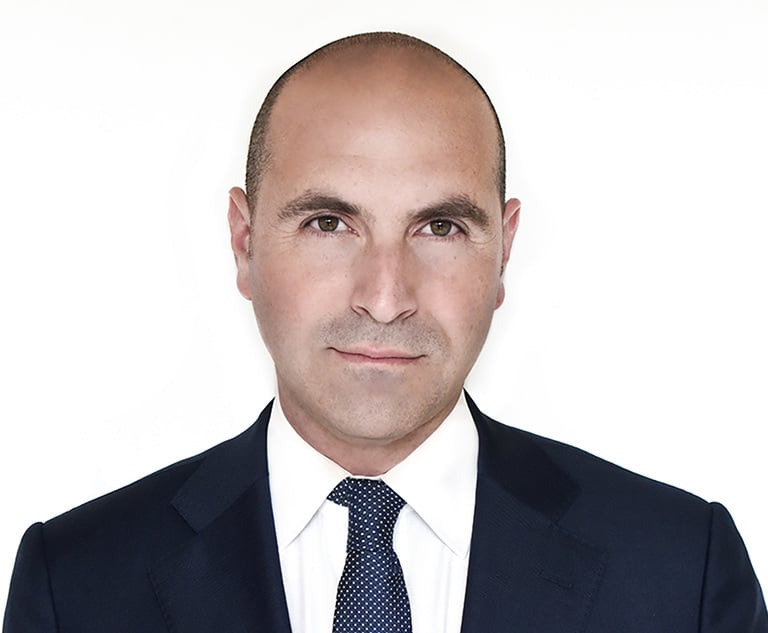
Growing Referral Network, Alternative Fees Have This Ex-Big Law’s Atty’s Bankruptcy Practice Soaring
5 minute read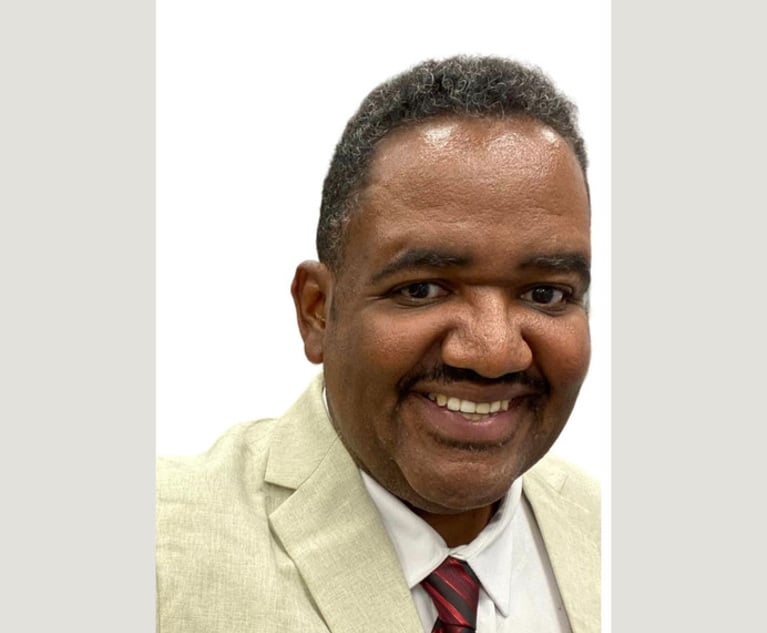
Against the Odds: Voters Elect Woody Clermont to the Broward Judicial Bench
4 minute read
Miami Civil Judge Myriam Lehr to Say Goodbye to the County Court Bench
4 minute readLaw Firms Mentioned
Trending Stories
- 1In Resolved Lawsuit, Jim Walden Alleged 'Retaliatory' Silencing by X of His Personal Social Media Account
- 2Government Attorneys Face Reassignment, Rescinded Job Offers in First Days of Trump Administration
- 3Disney Legal Chief Sees Pay Surge 36%
- 4Legaltech Rundown: Consilio Launches Legal Privilege Review Tool, Luminance Opens North American Offices, and More
- 5Buchalter Hires Longtime Sheppard Mullin Real Estate Partner as Practice Chair
Who Got The Work
J. Brugh Lower of Gibbons has entered an appearance for industrial equipment supplier Devco Corporation in a pending trademark infringement lawsuit. The suit, accusing the defendant of selling knock-off Graco products, was filed Dec. 18 in New Jersey District Court by Rivkin Radler on behalf of Graco Inc. and Graco Minnesota. The case, assigned to U.S. District Judge Zahid N. Quraishi, is 3:24-cv-11294, Graco Inc. et al v. Devco Corporation.
Who Got The Work
Rebecca Maller-Stein and Kent A. Yalowitz of Arnold & Porter Kaye Scholer have entered their appearances for Hanaco Venture Capital and its executives, Lior Prosor and David Frankel, in a pending securities lawsuit. The action, filed on Dec. 24 in New York Southern District Court by Zell, Aron & Co. on behalf of Goldeneye Advisors, accuses the defendants of negligently and fraudulently managing the plaintiff's $1 million investment. The case, assigned to U.S. District Judge Vernon S. Broderick, is 1:24-cv-09918, Goldeneye Advisors, LLC v. Hanaco Venture Capital, Ltd. et al.
Who Got The Work
Attorneys from A&O Shearman has stepped in as defense counsel for Toronto-Dominion Bank and other defendants in a pending securities class action. The suit, filed Dec. 11 in New York Southern District Court by Bleichmar Fonti & Auld, accuses the defendants of concealing the bank's 'pervasive' deficiencies in regards to its compliance with the Bank Secrecy Act and the quality of its anti-money laundering controls. The case, assigned to U.S. District Judge Arun Subramanian, is 1:24-cv-09445, Gonzalez v. The Toronto-Dominion Bank et al.
Who Got The Work
Crown Castle International, a Pennsylvania company providing shared communications infrastructure, has turned to Luke D. Wolf of Gordon Rees Scully Mansukhani to fend off a pending breach-of-contract lawsuit. The court action, filed Nov. 25 in Michigan Eastern District Court by Hooper Hathaway PC on behalf of The Town Residences LLC, accuses Crown Castle of failing to transfer approximately $30,000 in utility payments from T-Mobile in breach of a roof-top lease and assignment agreement. The case, assigned to U.S. District Judge Susan K. Declercq, is 2:24-cv-13131, The Town Residences LLC v. T-Mobile US, Inc. et al.
Who Got The Work
Wilfred P. Coronato and Daniel M. Schwartz of McCarter & English have stepped in as defense counsel to Electrolux Home Products Inc. in a pending product liability lawsuit. The court action, filed Nov. 26 in New York Eastern District Court by Poulos Lopiccolo PC and Nagel Rice LLP on behalf of David Stern, alleges that the defendant's refrigerators’ drawers and shelving repeatedly break and fall apart within months after purchase. The case, assigned to U.S. District Judge Joan M. Azrack, is 2:24-cv-08204, Stern v. Electrolux Home Products, Inc.
Featured Firms
Law Offices of Gary Martin Hays & Associates, P.C.
(470) 294-1674
Law Offices of Mark E. Salomone
(857) 444-6468
Smith & Hassler
(713) 739-1250





